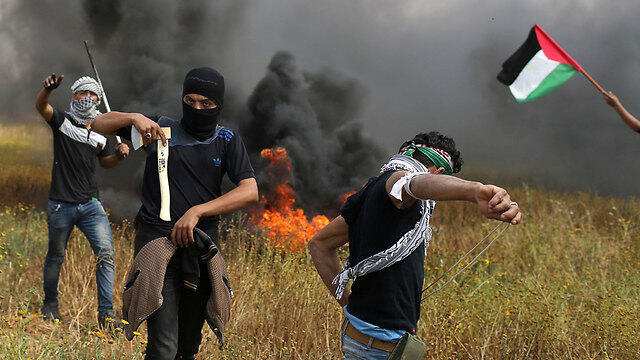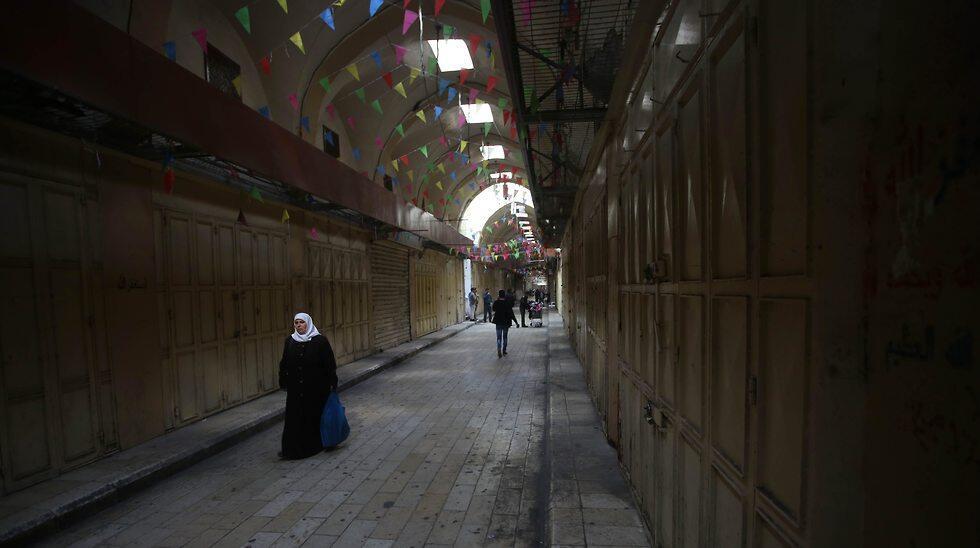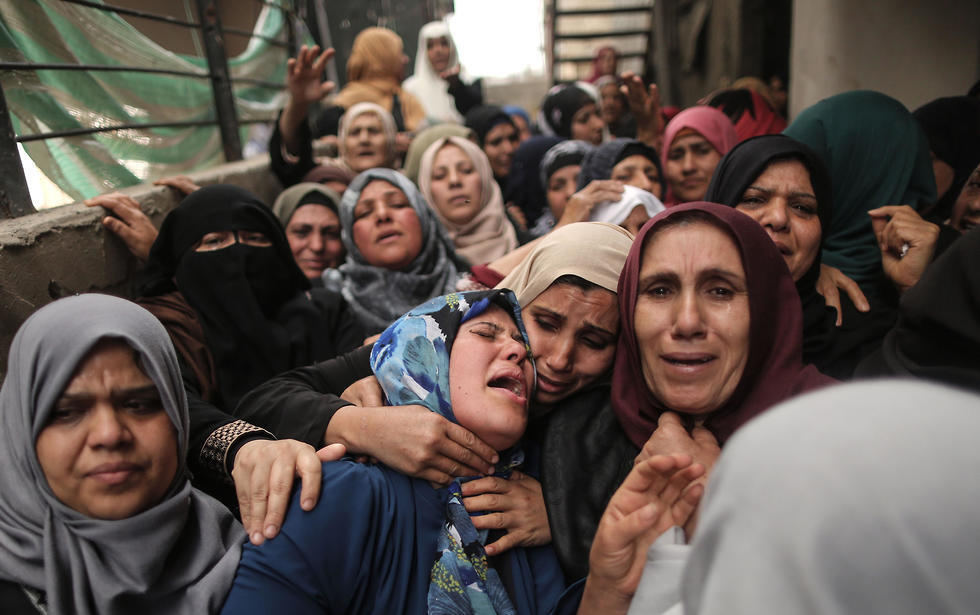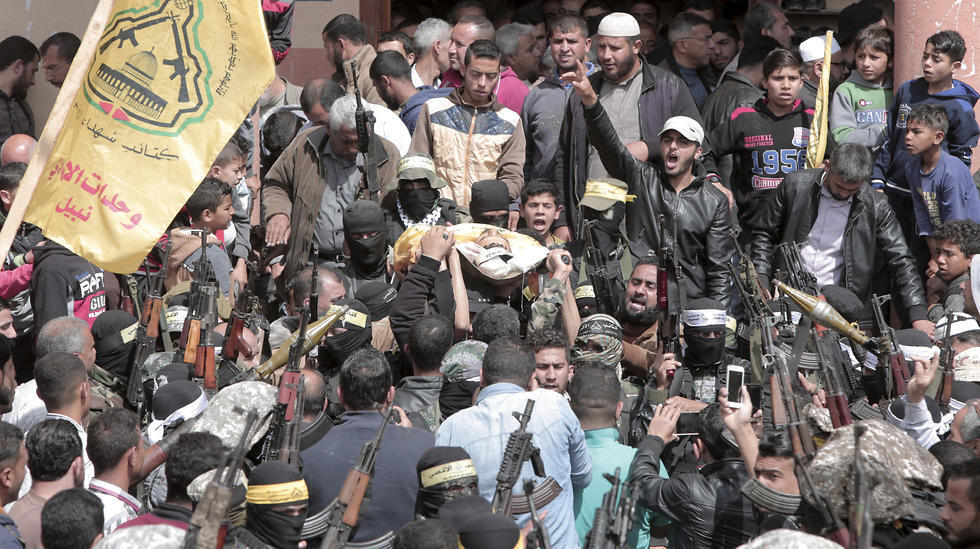Getting your Trinity Audio player ready...
The Hamas terror organization said Saturday that five of the dead in the clashes on the Gaza border the previous day were members of its military wing.
The terror group didn't detail the circumstances of their death, but it said they were killed "while participating shoulder-to-shoulder with the Palestinian people in March of Return activity."
Tens of thousands of Palestinians had gathered on Friday along the fenced 65-km (40-mile) frontier, where tents were erected for a planned six-week protest pressing for a right of return for refugees and their descendents to what is now Israel. The Israeli military estimate was 30,000.
The mass marches were led by Gaza's ruling Hamas group and touted as the launch of a six-week-long protest campaign. Palestinian health officials said 16 Palestinians were killed by Israeli fire and more than 750 hit by live rounds, making it the bloodiest day in Gaza since the 2014 cross-border war between Israel and Hamas.
In Friday's confrontations, large crowds gathered near the border fence, with smaller groups of protesters rushing forward, throwing stones and burning tires.
IDF troops responded with live fire and rubber-coated steel pellets, while drones dropped tear gas from above.
On Saturday, dozens of Palestinian youths gathered by the Gaza-Israel border, though the area remained mostly quiet.
In the southern Gaza Strip, residents said Israeli troops fired warning shots towards a crowd of youths, some of whom burnt tires. Health officials said two people were wounded and an Israeli military spokesman said he was checking the details.
5 View gallery


A Palestinian family at one of the tent encampments by the Gaza border on Friday
(צילום: EPA)
Elsewhere in the strip, thousands were attending funerals for those killed, with mourners holding Palestinian flags and some chanting "revenge."
Palestinian President Mahmoud Abbas declared Saturday a national day of mourning and a general strike was called across the West Bank.
"The large number of martyrs and people wounded in peaceful popular demonstrations shows that the international community must intervene to provide protection to our Palestinian people," Abbas said in a speech.
Abbas's spokesman, Nabil Abu Rdainah, said: "The message of the Palestinian people is clear. The Palestinian land will always belong to its legitimate owners and the occupation will be removed."
IDF Spokesman Brig. Gen. Ronen Manelis said Hamas was using the protests as a guise to launch attacks against Israel and ignite the area. He said Israel will target terror organizations in Gaza if the violence drags on.
"We won't let this turn into a ping-pong zone where they perpetrate a terrorist act and we respond with pinpoint action. If this continues we will have no choice but to respond inside the Gaza Strip against the terrorist targets we believe to be behind these events," Manelis told reporters in a phone briefing.
Brig. Gen. Manelis also denied allegations of excessive use of force, saying those killed by Israeli troops were men between the ages of 18 and 30 who were involved in violence and belonged to militant factions.
He further said Gaza health officials exaggerated the number of those wounded, and that several dozen at most were injured by live fire while the rest were merely shaken up by tear gas and other riot dispersal means.
Gaza City's Shifa Hospital received 284 injured people Friday, the majority with bullet injuries, said spokesman Ayman Sahbani. He said 70 were under the age of 18 and 11 were women.
He said 40 surgeries were performed Friday and that 50 were planned Saturday. "These are all from live bullets that broke limbs or caused deep, open wounds with damage to nerves and veins," he said.
Among those recovering from surgery was 16-year-old Marwan Yassin who had thrown stones with a slingshot at the fence Friday and was shot in both legs. One of his legs was wrapped in bandages and the other had a cast and metal fixtures. His mother said at his bedside that she would ban him from future protests.
Human Rights Watch criticized Israel's actions. "Israeli allegations of violence by some protesters do not change the fact that using lethal force is banned by international law except to meet an imminent threat to life," the New York-based group said, calling the number of killed and wounded "shocking."
Protest organizers have said mass marches would continue until May 15, the 70th anniversary of Israel's creation. Palestinians mark that date as their "nakba," or catastrophe, when hundreds of thousands were uprooted during the 1948 war over Israel's creation. The vast majority of Gaza's 2 million people are descendants of Palestinians who fled or were driven from homes in what is now Israel.
Manelis reiterated Saturday that Israel "will not allow a massive breach of the fence into Israeli territory."
The border protests were seen as a new attempt by Hamas to break the border blockade, imposed by Israel and Egypt after the Islamic militant group seized Gaza from forces loyal to its rival, Palestinian President Abbas, in 2007. The continued closure has made it increasingly difficult for Hamas to govern.
The large turnout of marchers in the dangerous border zone on Friday also seemed to signal desperation among Gaza residents. Life in the coastal strip has deteriorated further in recent months, with rising unemployment, grinding poverty and daily blackouts that last for hours.
The protest campaign is also meant to spotlight Palestinian demands for a "right of return" to what is now Israel.
At the United Nations ,Secretary-General Antonio Guterres called for an independent investigation, while Security Council members urged restraint on both sides. The council didn't decide on any action or joint message after an emergency meeting Friday evening.
Reuters, the Associated Press and AFP contributed to this story.
First published: 14:50, 03.31.18





